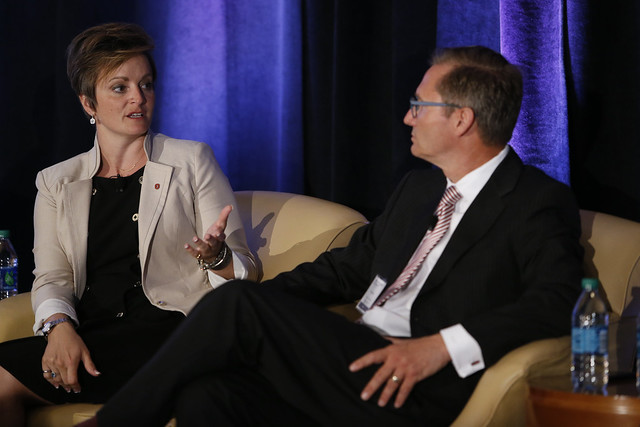Real Estate Conference focuses on smart cities

The impact of the Smart City Challenge Grant on the city of Columbus — and what the future holds for the region — were among the topics discussed during the third annual Real Estate Conference.
Hosted by The Ohio State Center for Real Estate, the event brought together real estate leaders, policymakers, academics and students for discussions centered around Columbus and the broader impact of information technologies on cities around the world.
"Columbus' designation as a Smart City will have far-reaching implications on the future of transportation, infrastructure and real estate," said Itzhak Ben-David, the Center's academic director and the Klatskin Chair in Finance and Real Estate at Fisher. "This event provided the Center's members, partners and friends the opportunity to take a deep dive into the many exciting facets of the new initiative."
Daniel Correa delivered the keynote address at the event. Correa, who served under President Obama as assistant director for innovation policy at the White House Office of Science and Technology Policy, led the White House Smart Cities Initiative and crafted the president’s 2015 Strategy for American Innovation. In his keynote, Correa focused on the latest trends around what makes a city smart, as well as the global smart cities movement.
"Mr. Correa's insight as a policymaker who led the creation of the Smart Cities Initiative was a tremendously valuable addition to the theme of this year's conference," Ben-David said.
The city's progress in implementing the projects and initiatives contained in the original proposal submitted to the US Department of Transportation were among the topics of a panel discussion that brought together three experts with close ties to the initiative:
- Joanna Pinkerton, co-director of the Honda/Ohio State Partnership, works with the College of Engineering, university, and industry and state executive teams to develop long-term strategies for utilization and growth of the university’s transportation expertise and assets.
- Alex Fischer serves as president and CEO of Columbus Partnership, a civic leadership organization composed of the city’s top business leaders. Under Fischer’s leadership, the organization was instrumental in winning the U.S. Department of Transportation’s Smart City Challenge.
- Michael Stevens, chief innovation officer for the City of Columbus, was appointed by Columbus Mayor Andrew Ginther as the first person to hold the position. Stevens is responsible for the Smart Columbus Initiative, which includes oversight of the original $50 million Smart City grant awarded to the city as well as $90 million pledged by local companies and partners. Stevens is also in charge of creating the long-term plans and partnerships needed to ensure Columbus is positioned for the future of smart technology and mobility.
As electric vehicles become more commonplace, the electric grid will need to evolve to keep pace with increased demand from consumers and businesses. The conference also featured Ryan Houk, director of Smart City Program Management at AEP Ohio, who discussed the potentially dramatic increase in the need for electric charging stations and the future of a reimagined electric grid. Houk is responsible for the overall management, coordination and execution of the Smart City initiatives with AEP Ohio.

Professor of Finance, Neil Klatskin Chair in Finance and Real Estate, Academic Director of the OSU Center for Real Estate
